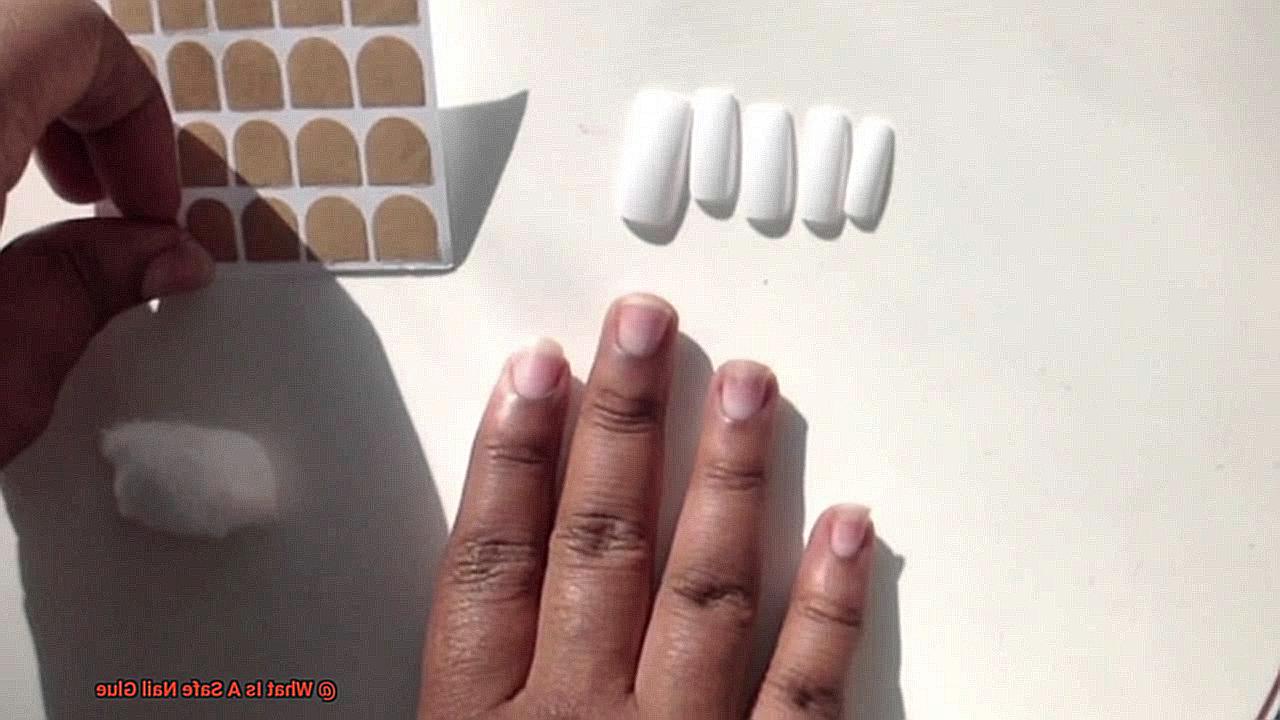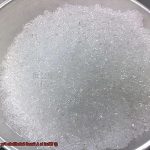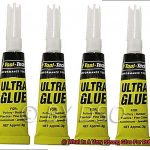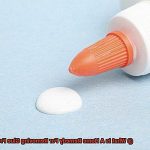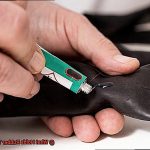Got a broken nail or dreaming of fabulous extensions? Nail glue is the ultimate hero in achieving flawless nails. But hold up. Before you start gluing away, let’s talk about safety. With so many options out there, finding a safe nail glue can be confusing. That’s where this blog post comes in. We’re diving into the world of safe nail glue and why it matters.
Whether you’re a nail pro or just love rocking killer nails, understanding the importance of safe nail glue will keep your nails looking fierce and your health intact.
Let’s get started.
What is Nail Glue?
Contents
- 1 What is Nail Glue?
- 2 Potential Health Risks of Nail Glue
- 3 Types of Nail Glue
- 4 Safety Considerations for Choosing Nail Glue
- 5 Benefits of Non-Toxic Nail Glue
- 6 Ingredients to Look for in Safe Nail Glues
- 7 Proper Usage Guidelines for Nail Glues
- 8 Signs and Symptoms of an Allergic Reaction to a Nail Glue
- 9 Conclusion
Nail glue, an essential tool in the beauty industry, is a specialized adhesive that is used to attach artificial nails or repair broken nails. It is a versatile product that allows individuals to create long-lasting and beautiful nail enhancements.
The main purpose of nail glue is to securely bond artificial nails or nail enhancements to the natural nails. This ensures that the nails stay in place for extended periods of time, providing individuals with the freedom to enjoy the benefits of artificial nails without worrying about them coming off easily.
Typically, nail glue is cyanoacrylate-based, meaning it contains an adhesive that reacts with moisture to form a strong bond. This quick-drying property makes it efficient and convenient to use. Nail glue is commonly found in small bottles with brush applicators, allowing for easy and precise application directly onto the nails.
When selecting a nail glue, it is important to prioritize safety. Some nail glues may contain harsh chemicals or irritants that can potentially harm the nails or skin. To ensure safety, it is recommended to choose nail glues that are free from harmful ingredients like formaldehyde, toluene, and dibutyl phthalate (DBP). These chemicals have been linked to potential health risks and should be avoided.
In addition to being free from harmful chemicals, safe nail glues often have low odor and are labeled as hypoallergenic and dermatologist-tested. This reduces the risk of irritation or allergic reactions for individuals with sensitive skin.
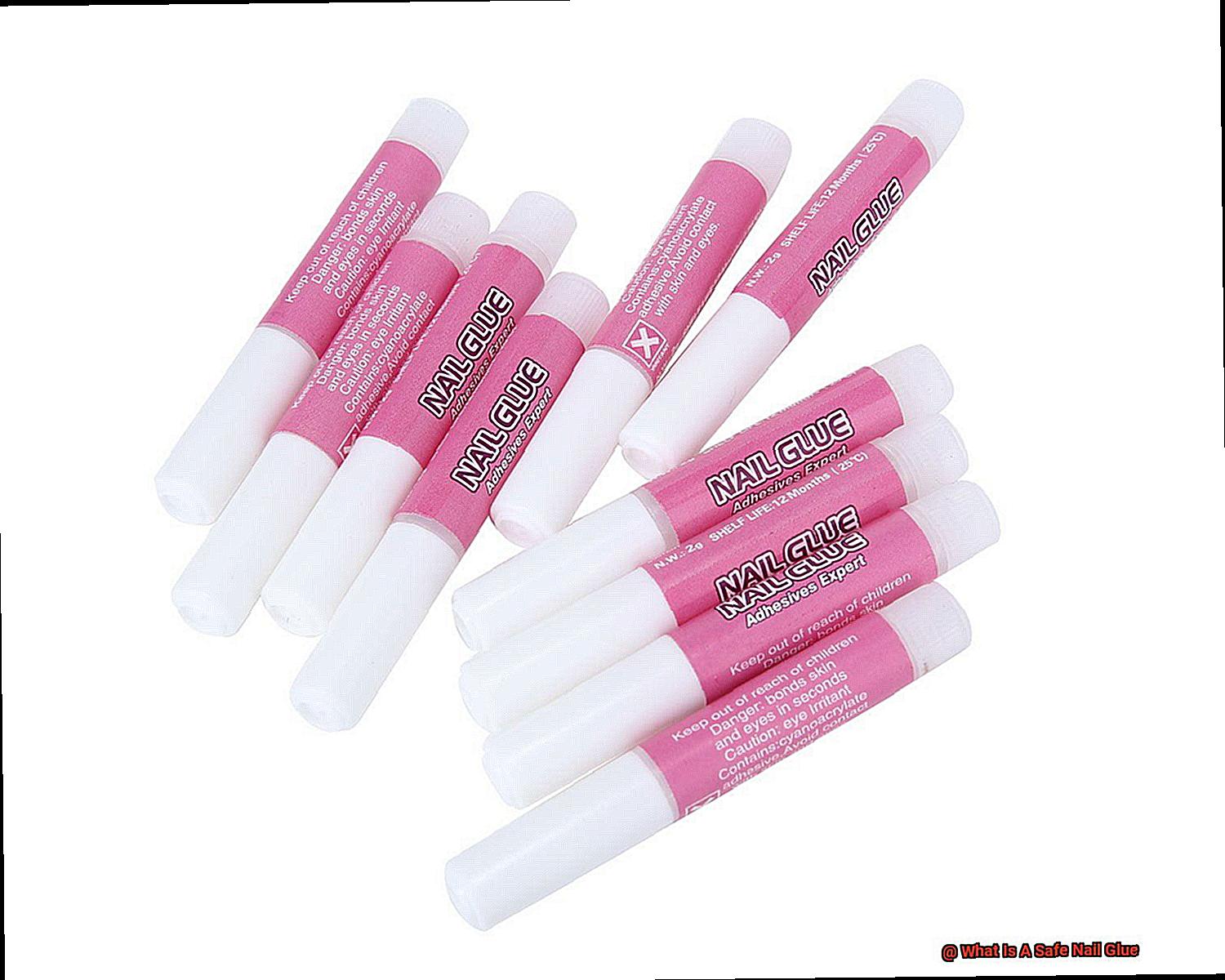
Furthermore, safe nail glues should also provide easy removal options. While a strong bond is desirable, it is equally important to be able to remove the artificial nails or nail enhancements without causing damage to the natural nails. Safe nail glues often allow for easy removal by soaking the nails in nail polish remover or using specific glue removal solutions.
Potential Health Risks of Nail Glue
Nail glue, although a handy tool for nail enhancements and repairs, does come with potential health risks that users should be aware of. One of the main concerns is the possibility of skin irritation or allergic reactions. Some individuals may have sensitivities or allergies to the chemicals in nail glue, leading to symptoms such as redness, itching, swelling, or a rash around the nail area. In more severe cases, prolonged or repeated exposure to nail glue can result in contact dermatitis—a chronic skin condition characterized by inflammation, blisters, and cracked skin. This can be particularly problematic for individuals who frequently use nail glue or work in professions that require its use.
Inhalation of fumes from nail glue is another potential health risk. The chemicals in the glue can release vapors that may irritate the respiratory system, causing symptoms such as coughing, wheezing, or shortness of breath. This risk is especially relevant in poorly ventilated areas or when using large quantities of nail glue.
Accidental ingestion of nail glue can also pose a health risk. Swallowing nail glue can lead to stomach irritation, nausea, vomiting, and in rare cases, blockage of the digestive tract. It is crucial to keep nail glue out of reach of children and seek immediate medical attention if ingestion occurs.
To minimize these potential health risks, it is important to follow safety precautions when using nail glue. This includes applying it only on clean and dry nails, avoiding contact with the surrounding skin, and ensuring proper ventilation during application. Individuals with pre-existing skin conditions such as eczema or psoriasis should exercise caution and may want to consider alternative nail adhesive options.
If any signs of skin irritation, allergic reactions, or respiratory symptoms occur after using nail glue, it is advisable to discontinue use and seek medical advice.
Types of Nail Glue
Exploring the Different Types of Nail Glue
Nail glue, a versatile product widely used in the beauty industry, serves the purpose of attaching artificial nails or repairing broken ones. With several types of nail glue available, each possessing its own unique characteristics and uses, it is important to understand the differences between them. Let’s delve into some of the most common types:
- Cyanoacrylate Glue: Commonly known as super glue, cyanoacrylate glue reigns as the most popular type of nail glue. Renowned for its rapid drying time, this glue forms an exceptionally strong bond between the natural nail and the artificial extension. It is often utilized for nail extensions or repairs due to its efficiency.
- Resin-Based Glue: Boasting a long-lasting bond that can endure for several weeks, resin-based glue is commonly employed in attaching artificial nails or nail tips. This type of glue provides a sturdy foundation that ensures longevity and durability.
- Acrylic-Specific Glue: Some nail glues are specifically formulated for use with acrylic nails. These glues guarantee a secure and long-lasting bond between the natural nail and the acrylic extension, ensuring optimal adhesion.
- Gel Nail Glue: With its gel-like consistency, gel nail glue is a preferred choice for those indulging in gel manicures. Applied to the nail and then cured under a UV or LED lamp, this glue creates a formidable bond that withstands the test of time.
- Brush-On Nail Glue: Brush-on glues offer convenience and precision with their built-in brush applicators. Ideal for repairing broken or split nails, these glues make application effortless and accurate.
When selecting a nail glue, safety should be a top priority. Opt for glues labeled as “non-toxic” or “safe for use.” Avoid those containing harmful chemicals such as formaldehyde, toluene, or DBP. It is also crucial to read customer reviews, seek certifications from reputable organizations, and follow the manufacturer’s instructions to ensure proper usage.
Safety Considerations for Choosing Nail Glue
When it comes to choosing nail glue, safety should be your top priority. Don’t let the allure of long-lasting results blind you to the potential risks. Here are some essential safety considerations to keep in mind:
- Non-toxic and nail-safe: Look for nail glues that are specifically labeled as non-toxic and safe for use on nails. These formulas are designed to be gentle, minimizing the risk of adverse reactions or irritations.
- Allergen information: Check the ingredients list for any allergens you may be sensitive to, such as formaldehyde or toluene. Avoiding these ingredients will help you steer clear of uncomfortable allergic reactions.
- Balance strength and safety: Stronger glues may promise longer-lasting results, but they often contain harsh chemicals that can weaken your nails over time or cause damage during removal. Find a balance between strength and safety to protect your nail health.
- Brush applicators over squeeze tubes: Opt for nail glues that come with brush applicators instead of squeeze tubes. The brush allows for precise and controlled application, reducing the chances of excess glue touching your skin or cuticles.
- No acetone: Avoid nail glues that contain acetone. This strong solvent can be harsh on your nails and surrounding skin. Choosing acetone-free glues ensures a safer and gentler application process.
- Proper storage: Store your nail glue in a cool and dry place, away from direct sunlight or heat sources. Extreme temperatures can affect the consistency and effectiveness of the glue, leading to less reliable results or accidents during application.
- Follow instructions: Always read and follow the manufacturer’s instructions. Each nail glue may have specific guidelines for application, removal, and safety precautions. Adhering to these instructions ensures a safe and satisfactory experience.
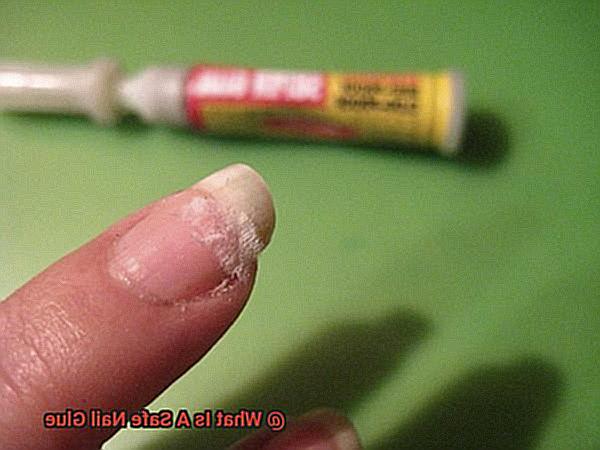
Benefits of Non-Toxic Nail Glue
Experience the vibrant benefits of non-toxic nail glue, where safety and style intertwine in a dazzling display. Embrace the advantages that await:
- Safety: Breathe easy, for non-toxic nail glue shields you from the clutches of harmful chemicals like formaldehyde and toluene. No longer shall your health be at stake.
- Allergen-free: Bid farewell to dreaded allergies as non-toxic glues, crafted with safer ingredients, grant solace to the sensitive souls. No more itching, swelling, or redness to mar your nail journey.
- Environmental-friendly: Take a step towards preserving our planet’s beauty by choosing non-toxic nail glue. Free from volatile organic compounds (VOCs), it dances harmoniously with the environment, sparing us from the pollution’s suffocating grip.
- Easy removal: Non-toxic glues gracefully bow out when it’s time for a change. No more wrestling with stubborn traditional glues that cling relentlessly to your nails. A gentler farewell awaits, leaving your nails unscathed and ready for a new chapter.
- Compatibility: Versatility is the name of the game when it comes to non-toxic nail glue. Embrace the freedom to experiment with acrylics, gels, or press-on nails, knowing that this glue will hold steadfastly through every stylish endeavor.
- Nail health: Nourish your nails with tender care as non-toxic alternatives caress them with gentle grace. Witness the transformation as they grow stronger, healthier, and more resilient under the nurturing touch of non-toxic glue.
Ingredients to Look for in Safe Nail Glues
When it comes to choosing a safe nail glue, it’s crucial to pay attention to the ingredients used in the product. Nail glues often contain various chemicals that can have different effects on your nails and overall health. To ensure you are using a safe nail glue, here are some key ingredients to look for:
- Ethyl Cyanoacrylate: This is the main ingredient found in most nail glues. It is a powerful adhesive that bonds quickly and securely. Ethyl cyanoacrylate is considered safe for use on nails as it forms a strong bond without causing any harm.
- Butyl Cyanoacrylate: Similar to ethyl cyanoacrylate, butyl cyanoacrylate is also commonly used in nail glues. It provides a durable bond and is known for its strength. It is considered safe for use on nails and is often found in professional-grade nail glues.
- Isopropyl Alcohol: This ingredient acts as a solvent in nail glues, helping to dissolve the adhesive and make it easier to apply. Isopropyl alcohol evaporates quickly, leaving behind a secure bond. While generally safe for use on nails, it’s important to use it in well-ventilated areas to avoid inhalation.
- Acrylates Copolymer: Nail glues often include acrylates copolymer, which enhances the strength and flexibility of the adhesive. This ingredient creates a more durable bond that can withstand everyday activities without breaking or chipping. It is considered safe for use on nails.
- Vitamins and Nutrients: Some nail glues go beyond their adhesive properties and include added vitamins and nutrients that promote healthier nails. Ingredients like biotin, calcium, and keratin nourish and strengthen your nails while providing an adhesive bond.
While these ingredients are generally safe for use on nails, it’s important to note that everyone’s sensitivity and allergies can vary. It is always recommended to do a patch test before using any new nail glue to ensure you do not have any adverse reactions.
In addition to looking for these safe ingredients, it is essential to avoid harmful chemicals such as formaldehyde and toluene, which can cause damage to nails and pose health risks.
Proper Usage Guidelines for Nail Glues
Nail glues are an essential tool for attaching artificial nails or fixing broken natural nails. However, it’s important to use them correctly to ensure safety and avoid any potential damage to your nails or skin. Follow these guidelines to achieve beautiful, long-lasting results without compromising your well-being.
- Read and follow the instructions: Each nail glue has specific application and usage recommendations. Familiarize yourself with these guidelines before using the product to ensure proper usage.
- Clean and prepare your nails: Remove any existing nail polish or oils from your nails using a gentle nail polish remover. This prepares the surface for better adhesion of the glue.
- A little goes a long way: Using excessive amounts of glue can cause it to seep onto your skin or cuticles, leading to irritation or allergic reactions. Apply a small dot or thin line of glue on your natural nail, covering the entire surface area where the artificial nail will be placed.
- Avoid contact with skin: Apply the glue sparingly and precisely, avoiding contact with your skin as much as possible. If any excess glue comes into contact with your skin, gently wipe it away before it dries to prevent potential irritation or discomfort.
- Gentle pressure for secure bonding: After placing the artificial nails on your natural nails, apply gentle pressure for a few seconds to secure the bond. Avoid excessive pressure or squeezing, as it may cause discomfort or damage to your nails.
- Handle with care and keep out of reach of children: Nail glues contain strong adhesives and chemicals that can be harmful if ingested or misused. Store them in a cool, dry place away from direct sunlight or heat sources, and keep them out of reach of children.
- Discontinue use if adverse reactions occur: If you experience redness, swelling, or itching after using nail glue, discontinue use immediately. These symptoms may indicate an allergic reaction or sensitivity to the product. Seek medical advice if the symptoms persist or worsen.
Signs and Symptoms of an Allergic Reaction to a Nail Glue
Signs and symptoms of an allergic reaction to nail glue can vary from person to person. However, there are some common indicators that you should be on the lookout for.
One of the most noticeable signs is redness around the nail area. This redness may be accompanied by intense itching, making you want to scratch your nails constantly. The discomfort can range from mild irritation to unbearable itchiness.
Swelling is another common symptom of an allergic reaction to nail glue. The skin around your nails may become puffy and swollen, making it painful or uncomfortable to touch. This swelling can make even simple tasks like typing or holding objects a challenge.
In some cases, an allergic reaction to nail glue can cause blistering, peeling, or cracking of the skin. This not only looks unsightly but also increases the risk of infection if left untreated. It’s crucial to address these symptoms promptly to prevent further complications.
It’s important to note that an allergic reaction to nail glue can affect other parts of the body if the glue comes into contact with the skin or if it is inhaled. For instance, accidentally touching your face after applying nail glue can lead to redness, itching, and swelling in that area as well.
In rare cases, a severe allergic reaction known as anaphylaxis may occur. This is a medical emergency that requires immediate attention. Symptoms of anaphylaxis include difficulty breathing, chest tightness, dizziness, and even loss of consciousness. If you experience any of these symptoms after using nail glue, seek medical help right away.
To prevent an allergic reaction to nail glue, read the ingredients list before purchasing any product and avoid those that contain known allergens such as formaldehyde or toluene. Conduct a patch test by applying a small amount on a small area of skin and observe for any signs of irritation or allergy for at least 24 hours.
If you have a history of allergies or sensitive skin, it’s best to consult with a dermatologist or allergist before using any nail glue. If you experience any signs or symptoms of an allergic reaction after using a nail glue, stop using it immediately and seek medical advice. Furthermore, if you have had a previous allergic reaction to nail glue or any other adhesive product, it’s important to avoid using them in the future.
Conclusion
In conclusion, the quest for a safe nail glue is vital to safeguarding both the allure of your nails and your overall well-being. Nail glue is a versatile elixir that grants you the power to craft stunning and enduring nail masterpieces. However, if chosen recklessly, it can also harbor potential dangers.
When embarking on the search for a nail glue, make safety your paramount concern by opting for products devoid of hazardous ingredients like formaldehyde, toluene, and dibutyl phthalate (DBP). These notorious chemicals have been associated with perilous health risks and should be shunned at all costs. Seek out glues that proudly bear labels proclaiming them hypoallergenic and dermatologist-tested. This way, you can minimize the odds of experiencing vexatious irritations or allergic reactions – especially if your skin tends to be sensitive.
Another crucial aspect to mull over when selecting a nail glue is its ease of removal. While an unyielding bond is undoubtedly desirable, it shouldn’t come at the expense of harming your natural nails when removing artificial enhancements. Trustworthy nail glues often offer painless removal options such as soaking your nails in nail polish remover or utilizing specialized glue dissolvers.
To ensure both efficacy and safety, adhere scrupulously to proper usage guidelines. Familiarize yourself with and faithfully follow the instructions provided by the manufacturer. Prioritize cleanliness by meticulously cleaning and priming your nails before application. Employ precision when applying a modest amount of glue, steering clear of any contact with surrounding skin. Finally, exert gentle pressure for secure bonding.
Should you encounter any signs of skin irritation, allergic reactions, or respiratory symptoms after using a particular nail glue, cease its use without delay and seek medical counsel promptly. Remember that everyone’s sensitivities and allergies differ; hence conducting a patch test before embracing any new product is always sage advice.

